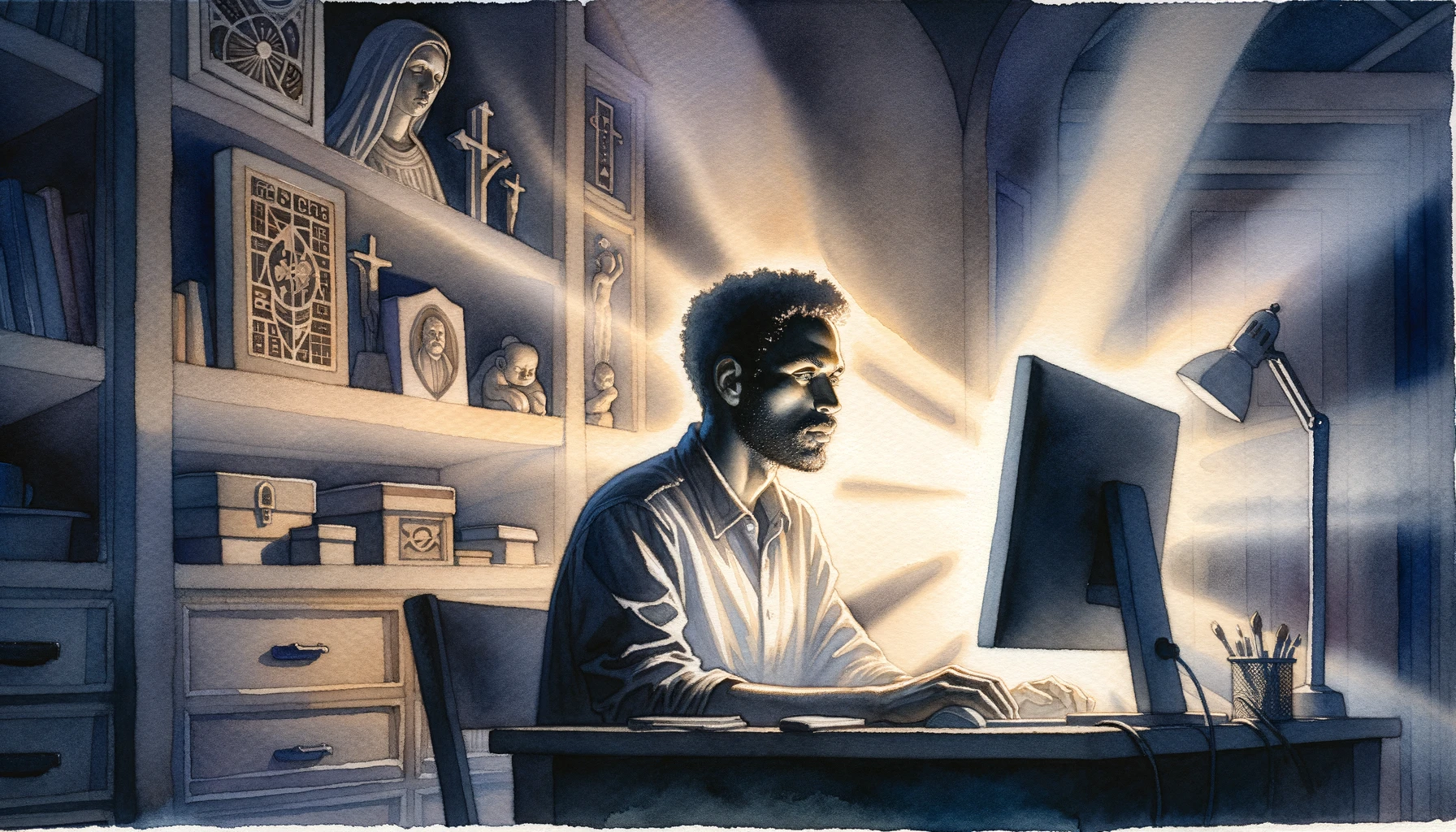At the heart of biblical teaching, we find the principles of love, respect, and integrity to be central themes. They serve as a compass to navigate the complexities of our world and offer guidance on the issues that often go unspoken in our modern society. Pornography is one such issue, and despite its prevalence, it remains a topic that needs illumination under the teachings of the Bible.
The Bible’s Perspective on Human Intimacy and Lust
The Bible does not mention the word “pornography” specifically. Still, it provides robust guidance on issues of lust, desire, and human intimacy. The essence of biblical teaching in this regard underlines the sanctity of the human body and the sacred bond that exists between individuals when they share their bodies in the context of a loving and committed relationship (Genesis 2:24-25).
Intimacy, in the biblical sense, is not just a physical act. It’s an emotional, spiritual, and physical connection that allows two individuals to become one. This is evident in the very creation of humanity, where man and woman were designed to complement each other, both physically and emotionally (Genesis 2:18-24). Biblical intimacy is centered on mutual love, respect, trust, and self-giving, a far cry from the objectification and depersonalization often found in pornography.
Lust, as depicted in the Bible, is a departure from this divine intention for human intimacy. The Bible speaks explicitly about lust and the temptation that arises from it. It teaches that lust is more than just a strong desire; it is an unchecked, selfish craving that objectifies another person for one’s pleasure (Matthew 5:28). This is not in alignment with the biblical intention for intimacy, which seeks mutual satisfaction and emotional bonding. The lustful attitude that pornography encourages disrupts this balance, promoting a self-serving view of intimacy that is contrary to biblical teachings.
The Bible also stresses that we must guard our minds and hearts. We are encouraged to seek pure thoughts and honorable desires (Philippians 4:8). Such purity is hardly compatible with the graphic and explicit nature of pornography. Pornography tends to promote and intensify lustful thoughts, making it challenging to maintain a clear and clean mind.
The Bible implies that our bodies are not mere objects for satisfaction but temples of the Holy Spirit (1 Corinthians 6:19-20). This perspective calls us to respect our bodies and the bodies of others, a stark contrast to the disregard for human dignity and respect often associated with pornography.
The Bible’s perspective on human intimacy is profound, focusing on mutual love, respect, trust, and self-giving. It emphasizes the sanctity of the human body and the sacred bond of intimacy within a committed relationship. The Bible teaches against lust, viewing it as an unchecked, selfish craving that disrupts the divine intention for intimacy. It encourages us to seek purity of thought and respect for our bodies as temples of the Holy Spirit. By examining these biblical principles, it becomes evident that pornography, with its promotion of lust and objectification, stands in contrast to these teachings.
The Impact of Pornography on Personal Relationships
Drawing from the biblical teachings, we know that relationships are designed to mirror the relationship between Christ and the church (Ephesians 5:25-33). This means they should be founded on mutual respect, selfless love, and emotional, spiritual, and physical unity. In stark contrast, pornography frequently portrays relationships and intimacy in a dehumanizing and objectifying manner. This skewed depiction may result in significant impacts on our personal relationships, largely negative.
Pornography often fosters unrealistic expectations about physical appearance, sexual performance, and the nature of sexual relationships. It can lead to dissatisfaction in real-life relationships, as it nurtures false standards that reality seldom meets. With the propensity to view partners through the lens of pornography, respect and genuine affection could be undermined, eroding the basis of healthy relationships.
One might argue that the secretive nature of pornography usage can breed a culture of deception within relationships. Trust, as taught in the Bible, is a cornerstone for any relationship (Proverbs 3:5-6). Yet, the habitual consumption of pornography may involve lies, secrecy, and dishonesty, which stand against this biblical principle. Thus, pornography can potentially harm the trust and transparency that healthy relationships require.
The focus of pornography is mainly on self-gratification and physical pleasure, thereby reducing the depth and richness of intimacy to mere physicality. It fosters a culture where sex is separated from love, commitment, and emotional connection, which are integral to biblical intimacy (1 Corinthians 7:3-5). This dichotomy between the biblical concept of intimacy and the version presented in pornography can lead to dissatisfaction and misunderstandings within relationships.
Viewing pornography might also lead to a sense of guilt and shame, which can negatively affect one’s mental and emotional health. These feelings are indicative of the Holy Spirit’s conviction of wrongdoing, which can lead to an internal conflict (John 16:8). This conflict can spill over into relationships, causing distress and disconnection.
The impact of pornography on personal relationships can be profoundly negative. Pornography fosters unrealistic expectations, which can lead to dissatisfaction in relationships. It often involves a culture of secrecy, which can erode trust, a cornerstone of biblical relationships. The focus on self-gratification and physical pleasure in pornography reduces the richness of biblical intimacy, potentially causing dissatisfaction and misunderstandings. Feelings of guilt and shame associated with pornography can cause distress and disconnection in relationships. This exploration clearly indicates a discrepancy between the nature of relationships as depicted in pornography and the biblical model of relationship.
Pornography and Spiritual Well-being: Understanding the Discrepancies
Turning our attention to the spiritual dimension, the Bible encourages us to walk in step with the Spirit (Galatians 5:16-25), nurturing qualities like love, joy, peace, patience, kindness, goodness, faithfulness, gentleness, and self-control. The question we need to ask is whether the consumption of pornography aligns with these principles.
There’s little argument that the explicit content of pornography encourages the opposite of self-control. It fuels the fires of lust, leading individuals down a path of sensual self-indulgence rather than promoting restraint and self-discipline. Such indulgence opposes the teachings of the Bible, which advises us to control our bodies in a way that is holy and honorable (1 Thessalonians 4:3-5).
The act of viewing pornography might conflict with the biblical exhortation to lead a pure life (Matthew 5:8). Purity, in a biblical sense, refers to more than just physical chastity. It extends to the purity of the mind and heart. By flooding the mind with explicit images and stimulating lustful thoughts, pornography stands as a hurdle to achieving the purity that the Bible encourages.
From the Christian standpoint, our faith is a relationship with God – a relationship that demands our complete devotion. The Bible teaches us to love God with all our heart, soul, mind, and strength (Mark 12:30). Engaging with pornography, however, can distract from this devotion. It can cause spiritual disconnection, dividing our focus and diluting our dedication to God.
Pornography can also feed into the sin of idolatry, which the Bible condemns (1 Corinthians 10:14). Idolatry is not just the worship of carved images; it extends to any obsession or addiction that takes the place of God in our lives. If pornography becomes an addictive habit, it risks becoming an idol that detracts from our worship and relationship with God.
The consumption of pornography can conflict with many principles central to spiritual well-being as per biblical teachings. It encourages indulgence rather than self-control, contradicting biblical exhortations to lead a life of restraint and honor. It serves as a hurdle to achieving the purity of mind and heart encouraged in the Bible. Viewing pornography can distract from devotion to God, causing spiritual disconnection. If it becomes an addictive habit, it risks feeding into the sin of idolatry by taking the place of God in our lives. By understanding these discrepancies, we see the potential harm pornography can have on our spiritual well-being.
Fostering Faithfulness in a Digitized World
Through our detailed examination of pornography in the context of biblical teaching, we’ve seen the stark contrast it presents. Pornography encourages self-serving desires that deviate from the principles of selfless love, mutual respect, and self-control upheld in biblical teachings. It can harm personal relationships and our spiritual well-being, both crucial elements of our Christian faith.
To stimulate further thought on the subject, consider these questions:
- How can you safeguard your mind against the influences of pornography?
- How might the insights from this discussion influence your view of relationships and intimacy?
- How can maintaining spiritual purity strengthen your relationship with God?
In the end, let us strive to uphold the teachings of the Bible as we navigate the digital world. Let’s remain steadfast in our faith, honoring God with our thoughts, actions, and relationships. Let this understanding of biblical teachings serve as a beacon of light guiding us through the complexities of modern life, keeping us anchored in our Christian faith.














